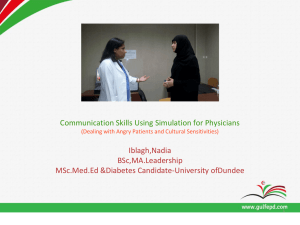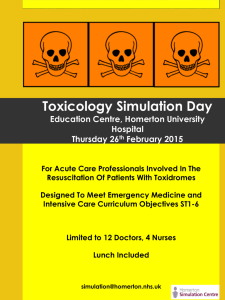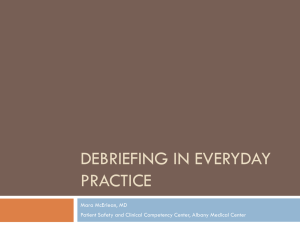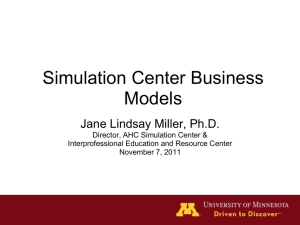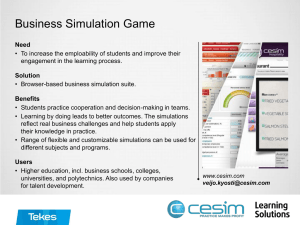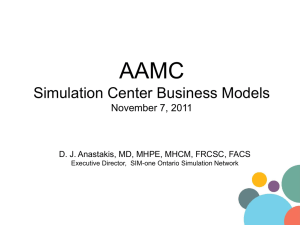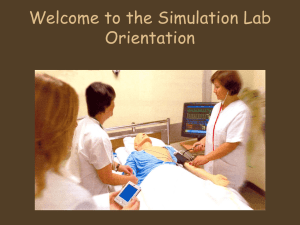1 note per table
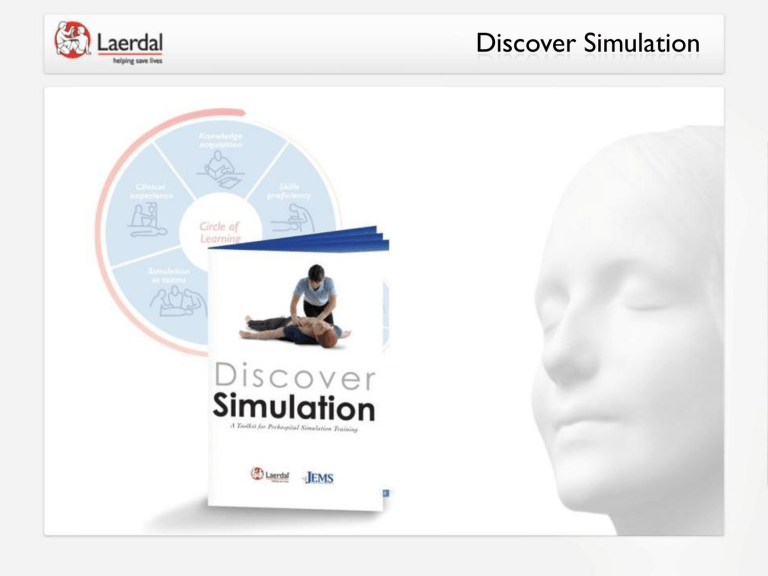
Discover Simulation
• Overview of Discover Simulation Toolkit
• Needs Assessment / Implementation
• Knowledge/Skill Acquisition
• Simulation in Teams
• Debriefing
• Close the Performance Gap
Agenda
What are the most important issues?
1 note per table
Agenda
Overview
Laerdal and JEMS provide comprehensive approach to teaching using blended learning methodology
Overview
Goal: Help make simulation training easy
Title that best describes your role
A. Dept. Training Officer
B. College Faculty/Instructor
C. Medical Director
D. Quality Role
E. Nursing
F. Other
21%
31%
10%
18%
21%
0% ra in in g O
De pt
. T
Co lle ge
Fa ffi ce r cu lty
/In st ru ct
Med or ica l D ire ct or
Qu ali ty
Ro le
Nu rs in g
Ot he r
Program’s current use of simulation in training programs
A. Regularly
(once a month)
B. Occasionally
(few times a year)
C. Limited
D. Never
23%
32%
19%
26% e a
mo
Re gu la rly
(o nc
Oc ca sio na lly nt h)
(f ew
ti me s a
...
Limi te d
Ne ve r
A. Teaching
B. Assessment
C. Do not use
D. Other
How do you use simulation?
36% 36%
18%
10%
Te ac hi ng
As se ss me nt
Do
n ot
u se
Ot he r
A. Formal class
B. User Network
C. Read Directions
D. Webinar
E. Conference
F. Other
Previous Simulation Training
41%
11%
15%
11%
4%
19%
Fo rma l c la ss
Us or k er
N et w
Re ad
D ire ct io ns
W eb in ar
Co nf er en ce
Ot he r
What Leads to Effective Learning?
Well-designed simulation training improves performance
My Overall Proficiency Using Simulation
A. Expert – can teach other instructors
B. Competent to teach students
C. Not ready to teach students
D. Just starting to learn
Turn-key education system…
Overview
Phases of Sim-Based Education
PERFORM LEARNING
NEEDS ASSESSMENT
CLOSE PERFORMANCE
GAPS & REPORT
KNOWLEDGE
ACQUISITION
Administer
Knowledge Pre-Test
Assign
Asthma Article
Discuss Asthma
Case Study
Administer
Knowledge Post-Test
Facilitate
Debriefing
Perform Asthma
Simulation
SIMULATION IN TEAMS
SKILLS PROFICIENCY
Practice Skills
Objectives linked to
EMT & EMT-P
Curricula >
Discover Simulation Components
Perform Learning Needs Assessment
Assess Needs -Why Use Simulation?
Reduce
Human Error
Assess Systems
Increase
Skill Development
Practice in
Controlled Environment
On-Demand
Access to Patients
Regulatory
Requirements
How does your organization perform needs assessment?
A. QI data analysis
B. Surveys
C. Interviews
D. Direct observation
E. Other
40%
20%
10%
17%
13%
QI
d at a a na lys is
Su rv ey s
In te rv ie w s
Di re ct
o bs er va tio n
Ot he r
Assess Needs
Review and discuss case study – select group spokesperson
Knowledge Acquisition
Discover Simulation Components
Article &
Pre/Post Test >
Item analysis worksheet >
Discover Simulation Components
Knowledge Acquisition
Discuss how data from the pre-test and post-test may be used to improve the quality of training.
Knowledge Acquisition
REMEMBER: Reflection, combined with feedback, enhances performance.
Skills Proficiency – Individual
Skills Proficiency
Discuss the availability of relevant skills checklists
Discuss the importance of validity and reliability
Skills Proficiency – Teams & Systems
Discover Simulation – Scenario Operations
Prepare for
Simulation >
Prepare…
1. the learners
2. the instructors
3. the simulator
4. the learning environment
Discover Simulation – Scenario Operations
Scenario Operations >
SimMan
ALS Simulator
SimPad
Discover Simulation Components
Discover Simulation – Scenario Operations
1. Watch learner’s performance
2. Click events
3. Performance is registered in the debriefing log
Discover Simulation- Scenario Operations
Initial State
O2 &
Beta Agonist
7 minutes
Improvement
O2 &
Beta Agonist
Deterioration
2 minutes
Improvement Fail
Discover Simulation – Facilitated Debriefing
Debriefing can make or break a simulation session
Discover Simulation - Facilitated Debriefing
You can see actions, but never frames
Rudolph J, et al. There’s no such thing as ”nonjudgmental” debriefing” A theory and method for debriefing with good judgment. Simul Healthcare 2006;1: 49–55
Discover Simulation – Facilitated Debriefing
Advocacy
• My perspective
• Use first person
• Make perspective clear
• I observed _______________
• I’m concerned / pleased because
_______________________
Inquiry
• Short, open ended questions
• “I wonder what happened…”
• I’m curious how you see it?”
Discover Simulation – Facilitated Debriefing
Beginning – Reactions Phase
Allow participants to express their initial reactions (emotion OK)
Discusses facts as necessary to eliminate confusion
Avoid ridiculing or shifting right to analysis
Middle – Analysis Phase
Ask questions that prompt the learner to discuss and reflect
Listen with genuine curiosity – seek to understand their “frames”
Avoid telling the participants what to do without getting them to reflect first
End – Summary Phase
Ask participants to summarize what they learned
“what went well?”
“Given a similar situation, what would you do differently?”
Level I
Evaluate the Simulation Education Program
Level II Level III Level IV
Reaction Learning Behavior Outcome / ROI
Return on
Expectations
Kirkpatrick, D.L., Evaluating Training Programs: The Four Levels. San Francisco, CA: Berret-Koehler Publishers,
1998.
Next Actions
1. Visit www.laerdal.com/discoversimulation
2. Register for follow-up webinar
3. Request toolkit and scenario
4. Join the Discover Simulation forum
Implementation www.laerdal.com/discoversimulation
Review & Questions
